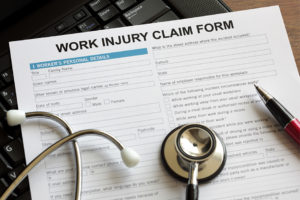Whether to File for Worker’s Compensation or a personal injury lawsuit is a dilemma many people face.
It arises out of the common assumption that personal injury law and workers’ compensation law are two sides of the same coin. The truth, though, is that the two types of laws vary widely. Here are some guidelines to help you learn more about the differences between workers’ compensation cases and personal injury lawsuits, so you can decide which type of case would be best for you to file.
First of all, American laws differ from state to state and city to city. If you’re not a licensed attorney with experience in workers’ compensation law, you may not know which type of law governs the type of injury you’ve sustained.
If you suffered an injury while at work, you should investigate the workers’ compensation laws in your own state. You may be able to receive compensation. Learn what rights you have and what possible damages (compensation for injuries) you may receive.
In most cases, you can’t sue your employer—even if you become injured on the job. That may not seem fair, since your employer may have neglected safety standards that led to the accident. Fair or not, work-related injuries—in most cases—fall under the workers’ compensation laws.
Personal injury cases, on the other hand, allow you to sue someone else when their negligence causes you harm. For example, if you visit your neighbor and fall through the porch because he neglected to repair a loose floorboard, your neighbor may be responsible for your injury. In these cases, you need to show that your neighbor was in fact negligent. To do so takes quite a bit of legal wrangling, particularly if your neighbor hired a competent attorney.
With a workers’ compensation claim, though, you need not prove that the employer was negligent. In most cases, people who become injured while working can usually lodge a successful claim for workers’ compensation benefits.

What Damages Can I Collect if I File for Workers’ Compensation?
In most cases, injured employees can receive benefits for their medical bills, including their doctors’ bills, surgery (if needed), and physical therapy. If the employee lost wages due to their injury, they may be able to recoup at least a percentage of those wages. If the employee suffered a disability due to his or her injury, he or she can collect benefits for at least a permanent partial disability in most cases.
What Damages Do Injured Persons Collect in Personal Injury Cases?
With personal injury cases, people can usually collect more damages, including compensation for the loss of any future earning potential, breakups or damage to relationships, and for the suffering they have incurred. That being said, though—such cases aren’t easy to prove without an expert attorney on one’s side. Court costs can mount up, reducing the amount of damages the injured person actually receives. That’s one reason why, if you were hurt on the job, it’s a better idea to see whether you are eligible for workers’ compensation benefits.
Can I Sue My Boss in Some Situations?
Sadly, in most situations, you can’t sue your boss. There are, however, exceptions. If, for example, a third party caused your injury—even if you were at work—you might be able to sue under personal injury statutes. When you hire a workers’ compensation attorney, she or he will look into what occurred in your case to determine whether you may be eligible to lodge a personal injury lawsuit as well.

Can I get Disability Insurance If I File for Worker’s Compensation?
According to California statutes, you can only receive disability insurance if your injury is not caused by conditions at work. Furthermore, those benefits are temporary. Here’s where it gets complicated, though. You can file a claim for disability insurance for a work-related injury, but you cannot receive benefits from both disability insurance and workers’ compensation at the same time.
If, however, your claim for workers’ compensation is denied –or even delayed–you may be eligible for disability insurance benefits. Similarly, if your workers’ compensation benefit is for a lesser amount than that of your disability insurance, you may be able to recoup the difference. Know, however, that if you do receive disability insurance payments during the time your workers’ compensation benefits are pending, the disability insurance carrier will file a lien to recover the disability insurance payments if your workers’ compensation benefits come through.
What If I Don’t Know If My Injury Occurred Due to Work?
If your injury might have occurred at work, you must report it to your employer. The examining physician or nurse practitioner will determine whether the injury was caused by conditions at work. The physician will report her or his findings to your employer’s workers’ compensation insurance provider.
What If My Employer or Her Insurance Company Disagree With My Claim?
When there are disagreements about whether a claim is work-related, your workers’ compensation attorney will again examine all the facts in the case. If she or he thinks you have a good case, you have the right to file an appeal, even if your benefits were denied the first time. Even though the appeal process can be lengthy and complicated, if you have a specialized workers’ compensation attorney, she or he will steer you through the process.
Can My Employer Penalize Me for Filing a Claim?
No. Federal and state statutes prohibit such action. Yet, employees often fear such retaliation because, as labor attorney Shannon Liss-Riordan puts it, “the balance between employers and employees is grossly disproportionate.” A workers’ compensation attorney can put those fears to rest and steer you through the claim process with confidence.
If I File for Workers’ Compensation, What Will My Attorney Do?
Your workers’ compensation attorney knows what California’s workers’ compensation law specifies. Since California laws regarding workers’ compensation can be difficult to understand—even for an attorney in general practice—you need a workers’ compensation expert on your side. The state often denies injured persons’ claims the first time they file. To avoid any mistakes that could keep you from the compensation you rightly deserve, do yourself a favor and find an experienced workers’ compensation attorney who can navigate his or her way around these complex laws.
To find an attorney with extensive experience in California’s workers’ compensation laws, contact the legal team at the House of Workers’ Compensation today.




